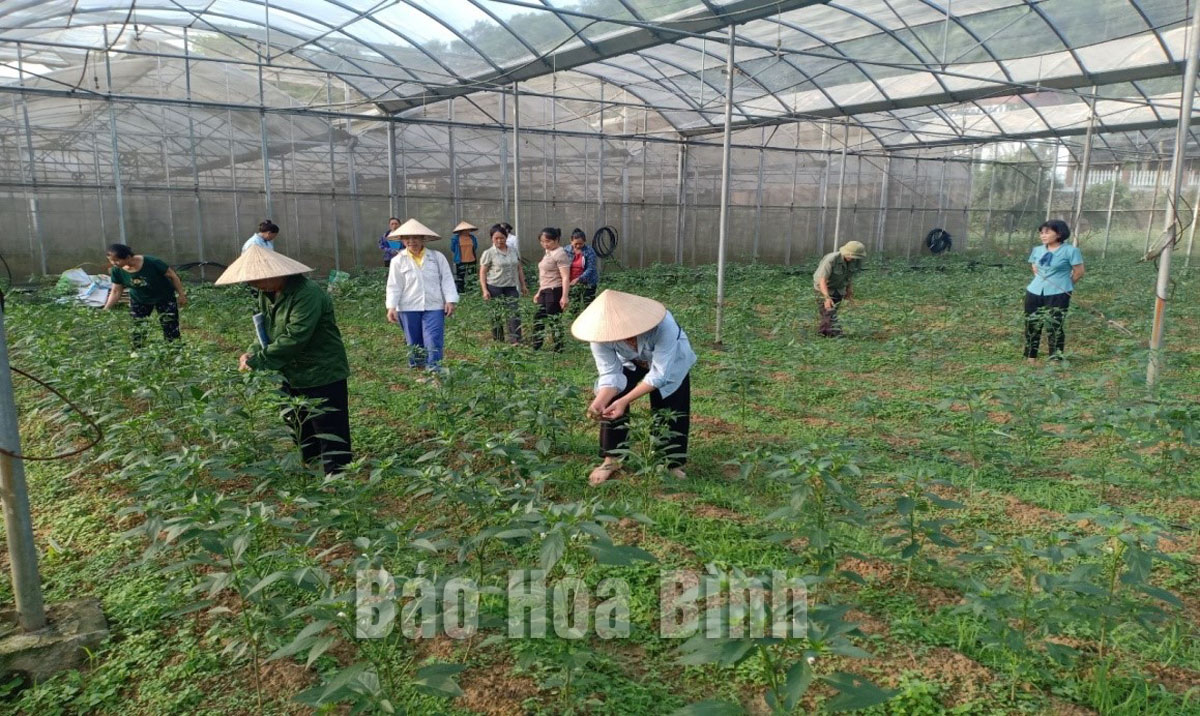
(HBO) – During the 2018-2023 period, farmer associations at all levels of Luong Son district have actively carried out supporting activities to help their members develop the "One commune, one product" (OCOP) model from strong agricultural products of the locality.
Officials of the provincial Sub-Department of Cultivation
and Plant Protection instruct farmers of Tan Vinh commune, Luong Son district,
to practice steps in planting area codes.
The district has strengthened the popularisation and product consumption on
online platforms in order to promote the cooperative economy and build
new-style cooperative development.
Since 2018, the district has established 13 cooperatives, five
branches and 46 farmer groups in areas of cultivation and animal husbandry.
Besides, consultancy and supporting activities have been
intensified. Over the past five years, the district farmer association has
organised 250 classes on technological science transfer, OCOP, application of
biotechnology in animal husbandry forover 12,600 members.
In order to help farmers sell and popularise their products, the
association has organised trips to manufacturing units and production
households for members to learn production models.
It has also supported members to sell 620 farming products on
e-commerce platforms such as Postmash.VN and made 540,000 traceability stamps
for organic agricultural production groups, Vietgap, OCOP products in the
locality.
The association also cooperated to build two shops to sell and
introduce local agricultural products to help members./.
According to data from the Hoa Binh Provincial Party Committee, the industrial production index for the first six months of 2025 is estimated to have increased by 20% compared to the same period last year. This marks the highest year-on-year growth rate for this period since 2020.
In the first six months of 2025, Hoa Binh province’s export turnover was estimated at 1.145 billion USD, marking an 18.11% increase compared to the same period in 2024. Import turnover was estimated at $ 804 million, a 17.15% increase, which helped the province maintain a positive trade balance.
The lives of the ethnic minority farmers in Tan Lac district have gradually improved thanks to the new directions in agricultural production. This is a testament to the collective strength fostered through the professional associations and groups implemented by various levels of the district’s Farmers’ Union.
With the motto the "product quality comes first,” after nearly one year of establishment and operation, Muong village’s Clean Food Agricultural and Commercial Cooperative, located in Cau Hamlet, Hung Son Commune (Kim Boi district), has launched reputable, high-quality agricultural products to the market that are well-received by consumers. The products such as Muong village’s pork sausage, salt-cured chicken, and salt-cured pork hocks have gradually carved out a place in the market and they are on the path to obtaining the OCOP certification.
In the past, the phrase "bumper harvest, rock-bottom prices" was a familiar refrain for Vietnamese farmers engaged in fragmented, small-scale agriculture. But today, a new spirit is emerging across rural areas of Hoa Binh province - one of collaboration, organisation, and collective economic models that provide a stable foundation for production.
Maintaining growing area codes and packing facility codes in accordance with regulations is a mandatory requirement for agricultural products to be eligible for export. Recently, the Department of Agriculture and Environment of Hoa Binh province has intensified technical supervision of designated farming areas and packing facilities to safeguard the "green passport" that enables its products to access international markets.



